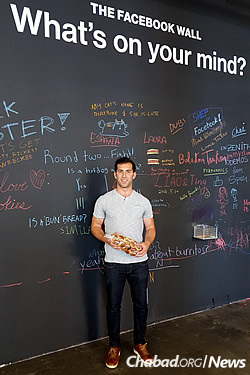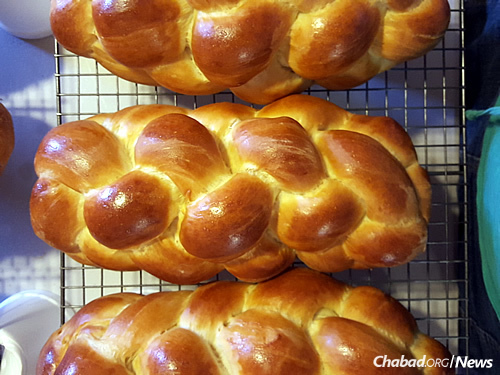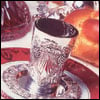App developers gathered in San Francisco recently for Facebook’s annual F8 conference. Culled from the technology and digital media elite, they came to explore the latest announcements from the tech giant.
When Seth Rosenberg, product manager for Facebook’s Messenger platform, took the stage to explore the company’s new Messenger Bot platform, the Facebook faithful learned a surprising inspiration for this latest technological gambit: weekly batches of challah baked by Chabad-Lubavitch emissary Ella Potash, co-director of Chabad of Redwood City, Calif., with her husband, Rabbi Levi Potash.
Bots, which let users get information and even purchase products through interactive conversations on the popular messaging service, are currently trending in the tech world. Everyone from Microsoft and Amazon—and now Facebook—has begun using it to change the way humans interact with technology. Facebook’s foray has the potential to reach Messenger’s 900 million monthly active users worldwide.
For Rosenberg, who has worked at Facebook since 2012, the inspiration derived from the twisted loaves of bread came naturally. “Growing up, my mother made challah every week,” he said. “Shabbat was something special to our family.”
When he moved to the Bay Area, however, he found himself isolated from Jewish life. “I’m not plugged into the Jewish community here,” he said. “Finding out about [Potash’s] challah has opened new ways for me to connect and explore my Judaism.”
“When we started developing the Messenger Bots platform, the experience that showed me bots could work was getting this challah,” explained Rosenberg. “It wasn’t this dry transaction on an e-commerce site. Instead, I could talk; I could ask questions and have this personal interaction.”
The bot platform represents an attempt to mirror the personal, conversational ways that business could be done online, he summarized.

‘Love of Shabbat’
Growing up in Santa Barbara, Calif., Potash would watch her father, Chabad-Lubavitch emissary Rabbi Yosef Loschak, make and distribute challah to members of his Southern California community.
“Every week, we would bake challah with Tatty,” Potash said (using the Yiddish term for “father”). “It was this amazing experience of seeing my father share his love of Shabbat with those he knew.”
Upon moving to Redwood City in the San Francisco Bay Area in 2009, making challah became a natural part of her family’s weekly routine. However, after Potash’s father passed away in 2014, she found a new sense of connection and mission by baking loaves for her community using his recipe—and even using the very mixer he had once given to her.
Last July, a Shabbat guest suggested that Potash sell challah to members of the community. “I was hesitant at first,” she acknowledged, “but after some thought, I told the guest that if six people interested in getting challah could be found, I would do it.”
The very next week, six fresh challahs were delivered to Facebook’s campus.
One Deed Inspires Another
Since then, interest has boomed, with some 75 people eagerly awaiting their weekly delivery of “Ella’s Challah.” Profits from the sales help fund Chabad’s numerous programs and events for adults and children alike, from classes to holiday festivities to Shabbat dinners and more.
Each Friday, the loaves of challah—still warm from the oven—are dropped off with a contact at Facebook’s campus in Menlo Park and Google’s campus in Mountain View, in addition to local Jewish preschools.
Through this, Potash said she “started to feel a deeper connection to my father. I felt like I was able to share the Shabbos experience he used to treasure and teach to others.”

That connection spread to others. Since the challah was ordered and paid for on Facebook’s Messenger platform, it wasn’t uncommon for her to chat with those ordering, engaging them in online conversation and hearing their thoughts.
When Rosenberg mentioned that the challah reminded him of his mother, she initially didn’t ascribe much to the comment. It was only afterwards that she learned that, like her father, Rosenberg’s mother had recently passed away. Potash helped him honor his mother’s memory on the annual yahrzeit, the anniversary of her passing.
As for the challah, “it has now become this tradition at Facebook,” declared Rosenberg. “People pick up their challah, say ‘Shabbat Shalom!’ and bond on Friday. Suddenly, people you didn’t know were even Jewish are asking where they can get it.”
What’s more, the whole experience has helped Rosenberg explore Jewish practice on his own. He recently hosted a Shabbat meal with friends, using family recipes his mother had compiled, along with, of course, Potash’s now famous challah.
“You get this challah, it’s delicious, and you want to use it” for something more than just a meal, he says. “What better way to enjoy it than to share it with others at a Shabbat of your own?”









Join the Discussion